|
|
|
Sort Order |
|
|
|
Items / Page
|
|
|
|
|
|
|
| Srl | Item |
| 1 |
ID:
114067
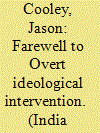

|
|
|
|
|
| Publication |
2012.
|
| Summary/Abstract |
At times, the leaders of nations send numerous troops abroad so that governments can be created or preserved. Some of these operations are completed without much trouble, but it is important to emphasise how many turn out to be quite arduous. Most officials elect to abandon these difficult missions. This tendency was actually on display in the 1980s. At the beginning of this decade, the leaders of Iran elected to invade Iraq. As this operation commenced, Iranian officials were quite confident that another Islamic theocracy could be established inside this Middle Eastern nation. However, once multiple setbacks were experienced, this confidence began to dissipate and the initiative was brought to an end. Since the conclusion of the 1980s, only a small number of nations have made the same transition as Iran. In this article, it will be argued that the US recently became a member of this select group.
|
|
|
|
|
|
|
|
|
|
|
|
|
|
|
|
| 2 |
ID:
155433
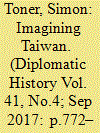

|
|
|
|
|
| Summary/Abstract |
The paper explores South Vietnamese efforts to draw on the lessons of the Taiwan and Korean “developmental states” and to employ these lessons in Saigon’s modernization efforts. It argues that development, shaped by debates about Taiwan and Korea, played an important role in the outcome of the war.
|
|
|
|
|
|
|
|
|
|
|
|
|
|
|
|
| 3 |
ID:
114626
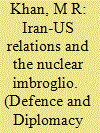

|
|
|
|
|
| Publication |
2012.
|
| Summary/Abstract |
Prior to World War II, the US involvement with the Persian Gulf
was minimal as it was regarded as a British preserve. However,
during the war, a US Middle East Command was created to oversee
the supply route of war material to the Soviet Union through Iran
and it consisted of some 30,000 personnel. But after the war, it was
reduced to a small contingent stationed at Jufair and Bahrain under
an arrangement with the British. The task of containment of the
Soviets in the huge arc from the Suez to the Malacas was also left to
the British. When the UK decided to withdraw from the region in
1968 due to financial constrains, Washington was in no position to
fill the so-called vacuum due to its heavy commitments elsewhere,
especially in Vietnam.
|
|
|
|
|
|
|
|
|
|
|
|
|
|
|
|
| 4 |
ID:
131454
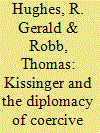

|
|
|
|
|
| Publication |
2013.
|
| Summary/Abstract |
The majority of scholarly accounts suggest that Anglo-Americans throughout the era of détente, 1969-1977, were often fraught with difficulties. In particular, the relationship between the Nixon administration and the British government of Edward Heath is often seen as the nadir for the Anglo-American relationship during the Cold War. Nonetheless, elements of the Anglo-American "special relationship," particularly those related to intelligence and nuclear co-operation, are often seen by scholars to have operated outside of these wider political difficulties. By utilising recently declassified documentation from both U.S. and UK archives, it is shown that both intelligence and nuclear co-operation were continually used by the United States as a means of convincing London to follow more amenable policy lines. With Henry Kissinger very much to the fore, it is illustrated how this coercive diplomacy had mixed results in achieving what Washington desired. Ultimately, this policy line would not accomplish what its main adherent, Henry Kissinger, sought.
|
|
|
|
|
|
|
|
|
|
|
|
|
|
|
|
| 5 |
ID:
096607
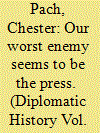

|
|
|
| 6 |
ID:
145218
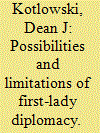

|
|
|
|
|
| Summary/Abstract |
Imelda Romualdez Marcos is commonly remembered as a profligate spender and power-hungry consort to Ferdinand E. Marcos. But Imelda Marcos performed a variety of first-lady roles, and her political ambition at home was matched, even reinforced, by her diplomatic work abroad. Imelda’s overseas journeys, and dealings with Nixon, exemplified a blend of opportunism, possibility, and limitation reflective of the elastic duties of a first lady, and they marked an important part of her transformation into a political force within the Philippine government. Although Nixon and his staff tried to hold Imelda at arms’ length, she forced the White House to receive her during visits to Washington in 1970 and 1971. These Nixon-era diplomatic forays lifted Imelda’s standing in the Philippines and paved the way for her to make official visits to other nations, gain government positions during the Marcos dictatorship, and grow arrogant as she pursued a “Jet Set” lifestyle.
|
|
|
|
|
|
|
|
|
|
|
|
|
|
|
|
|
|
|
|
|